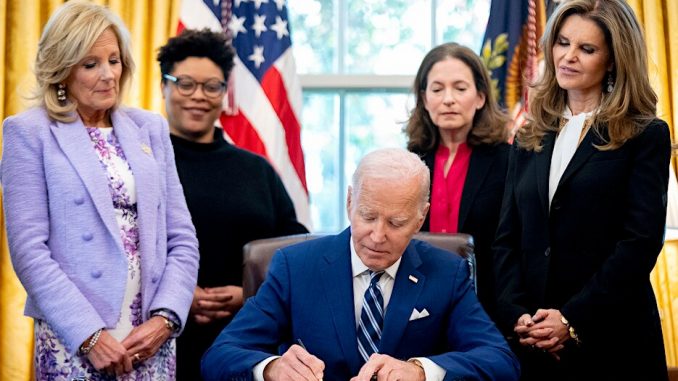
| Published June 3, 2025
In the final days of his presidency, Joe Biden issued a series of pardons and commutations, including clemency for family members and the commutation of 37 federal death sentences to life imprisonment. These actions have come under scrutiny by the Justice Department under President Donald Trump, particularly focusing on the use of an autopen—a device that replicates a signature—to authorize these pardons.
Ed Martin, appointed as the DOJ’s pardon attorney and head of the newly established “Weaponization Working Group,” has announced an investigation into these clemency decisions. The probe aims to assess whether President Biden was fully aware and competent in issuing these pardons, especially in light of his health concerns, including a cancer diagnosis. Martin has emphasized the need to examine the circumstances surrounding the use of the autopen and the decision-making process behind the pardons.
While the U.S. Constitution grants the president broad clemency powers, the investigation raises questions about the procedural aspects of these pardons. Legal experts have noted that the Constitution does not specify the method by which a pardon must be signed, and historical precedents exist for the use of autopen in official documents.
The outcome of this investigation could have significant implications for the interpretation of presidential pardon powers and the protocols surrounding their execution.
Here are the key implications of the controversy surrounding President Biden’s use of an autopen to authorize pardons—now under investigation by the DOJ under President Trump:
⚖️ 1. Constitutional Gray Area in Presidential Power
Legal Precedent Tested: The Constitution grants the president sole authority to issue pardons, but it’s silent on the method. The use of an autopen (a machine that replicates a signature) isn’t unprecedented but has never been challenged in the context of clemency for death row inmates or family members.
Potential for Legal Challenges: If the DOJ investigation finds irregularities or argues Biden wasn’t fully aware or capable at the time, it could lead to court battles challenging the validity of certain pardons.
—
🧠 2. Presidential Competence Now a Political Weapon
Health Concerns as a Factor: The probe is partly fueled by questions about Biden’s cognitive health, especially after reports of a cancer diagnosis and limited public appearances. This opens a broader debate about a president’s mental fitness and how it may affect the legality of their decisions.
Setting Precedents for Future Probes: If the investigation gains traction, it may set a precedent for future administrations to retroactively scrutinize clemency actions—an area traditionally seen as absolute.
—
🔄 3. Potential Reversal or Reexamination of Pardons
Political Fallout for Recipients: Those who benefited from these pardons—including politically connected individuals—could face reputational risk or renewed scrutiny, especially if the pardons are deemed unethical or improperly executed.
Policy Changes Ahead: The DOJ could move to tighten internal procedures around clemency, potentially ending the informal use of autopen or requiring direct, verifiable signatures.
—
🔥 4. Intensified Partisan Conflict
Weaponization of DOJ Alleged by Both Sides: Critics argue that Trump’s DOJ is politically motivated in targeting Biden’s last-minute decisions. Supporters say it’s about restoring transparency and accountability.
Fuel for 2026 and 2028 Campaigns: This probe may become a talking point in upcoming elections, with both parties using it to accuse the other of corruption or institutional abuse.
🧭 Overall Takeaway:
The DOJ’s investigation into President Biden’s use of an autopen to authorize high-profile pardons exposes a volatile intersection of executive power, constitutional ambiguity, and political retribution. While the president’s clemency authority is broad and historically unchecked, this probe challenges whether method and mental competence matter in the legal execution of that power.
At stake is not just the fate of the pardons themselves, but the precedent it sets for future presidents, pardon procedures, and the politicization of justice. It reflects a deepening distrust between administrations and signals that even the most absolute presidential powers are no longer immune to partisan review.
SOURCES: NEWSMAX – DOJ’s Ed Martin Investigating Biden Autopen Pardons
SPECTRUM NEWS – Newly tapped DOJ pardon attorney says he will ‘take a hard look’ at Biden-issued clemency, dismisses autopen criticism
THE HILL – Who was really running the country while Biden was president?
ABC NEWS – Ed Martin, Trump’s DOJ pardon attorney, says he’ll review Biden’s outgoing pardons





Be the first to comment